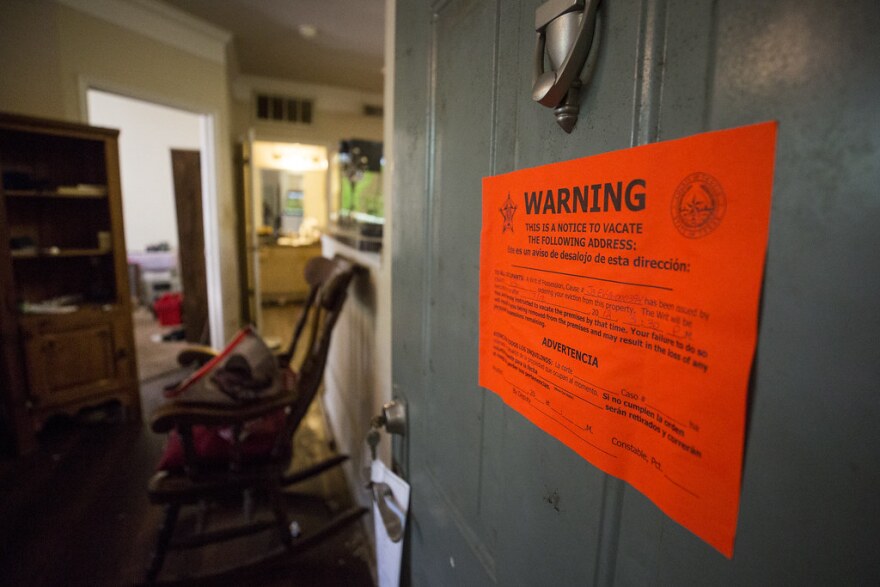After more than a year of banning many evictions in Austin and Travis County, local officials say they will allow current orders to expire at the end of December.
“[These orders were] designed in a way to roll off,” Austin Mayor Steve Adler told KUT last week.
Adler said people who have been unable to pay rent because of the pandemic have hopefully been able to receive financial assistance from the state, county or city. This year, the City of Austin doled out more than $40 million in federal and local funds to renters and landlords. Jurisdictions have since ran out of money, and Adler added that this means landlords aren't getting paid.
“We had also gone through the money that we were able to provide in support of an eviction moratorium,” he said. “Hopefully people were able to use the transition period and the dollars to put themselves in better positions.”
But as the number of COVID cases once again surges, the decision to lift the eviction moratorium may also be a legal one.
“I think we had probably pressed the limits for what the courts would allow us to do,” Adler said. He declined a request for a second interview to clarify what he meant, but sources familiar with the issue said the county, which has issued orders alongside the city, was concerned about a potential lawsuit.
“Federally, locally, across the board, there were threats of litigation to eviction moratorium orders,” Travis County Judge Andy Brown told KUT. “So that was a consideration, of course," in letting the eviction orders expire.
In September, a lawyer representing the Austin Apartment Association sent a letter to Travis County Attorney Delia Garza arguing that orders banning evictions were illegal and that the county did not have the authority to issue them. (Sources said the same letter was sent to the City of Austin, but KUT was not able to obtain a copy of that letter.)
“Although the eviction moratorium purports to have been issued pursuant to a county judge’s authority under the Texas Disaster Act, the reality is that the Act provides a county judge with no such authority,” Attorney Scott Powers wrote.
At the close of the letter, he wrote: “If the moratorium is enforced or extended again, AAA will be left with no choice but to examine other courses of action to protect the rights of its members."
But Adler and Brown went ahead and extended the eviction orders, something they have consistently done since March 2020. The orders banned most residential landlords from filing an eviction against a tenant who owes rent, provided that rent was no more than $2,475 a month. The orders also applied to commercial landlords of businesses affected most by the pandemic, such as restaurants and music venues.
Officials began loosening the rules in June, allowing landlords to start evicting tenants who were more than five months behind on rent. Each month that threshold was lowered, until December, when landlords could begin evicting renters who owed more than one month of rent.
Adler and Brown have maintained that these orders helped prevent the spread of COVID.
“These eviction protections help keep thousands of people in our community housed and save lives,” Brown said earlier this year. “We must keep these eviction protections in place to protect the health and safety of our community while we work to rapidly vaccinate all of Travis County.”
But as another wave of COVID cases fueled by the omicron variant hits Austin, advocates for low-income renters wonder if the orders should be extended once again.
“The risk of being displaced at this moment and living in congregant housing, having to hire movers … the risk of catching COVID and community spread of COVID is higher than ever,” said Shoshana Krieger, project director at Building and Strengthening Tenant Action (BASTA).
Krieger, whose organization tracks evictions filed in Travis County courts, noted a recent uptick in eviction filings. She said while the number of evictions filed per week during the pandemic hovered around a couple dozen, in mid-December landlords filed more than 90 evictions in a week.
And as tenants who have failed to pay rent stare down a potential eviction, the average price of rent in the Austin area has been rising at a historic rate. Krieger said she worries that people facing eviction in court or choosing to leave on their own may have to find housing outside the city.
"Tenants who are evicted or displaced in this moment are much less likely to be able to continue to afford to live in Austin," she said.
Given the recent surge in COVID cases, Brown told KUT on Wednesday, the county could possibly reinstate an order banning evictions.
“Nothing is off the table,” he said.
But Emily Blair, executive vice president of the Austin Apartment Association, emphasized that orders like these were always intended to go away.
“As with many of the early pandemic policies, local eviction moratoriums were intended to be temporary,” she wrote to KUT in an email.

















